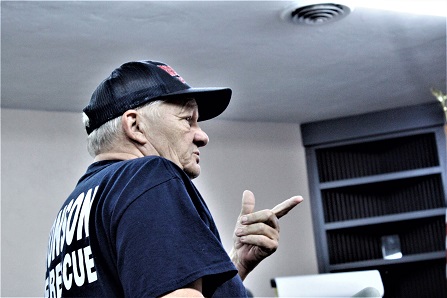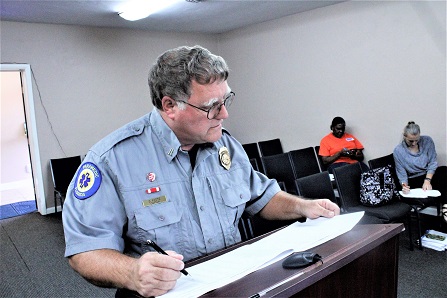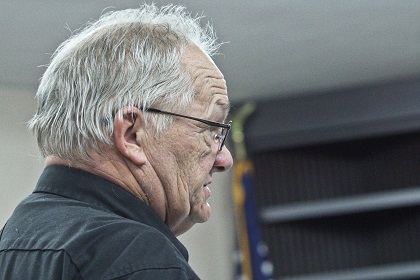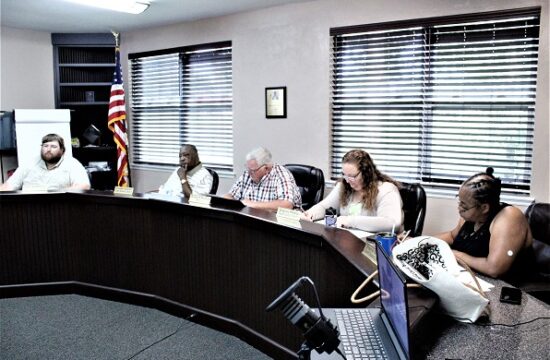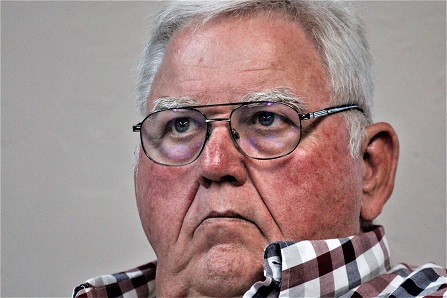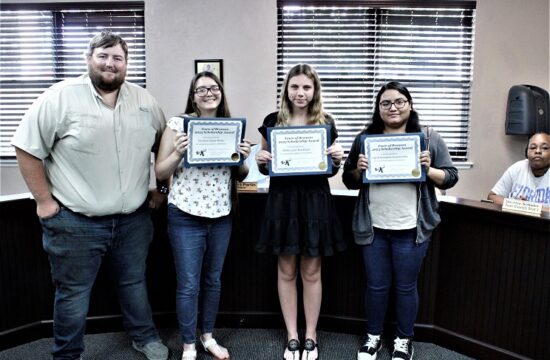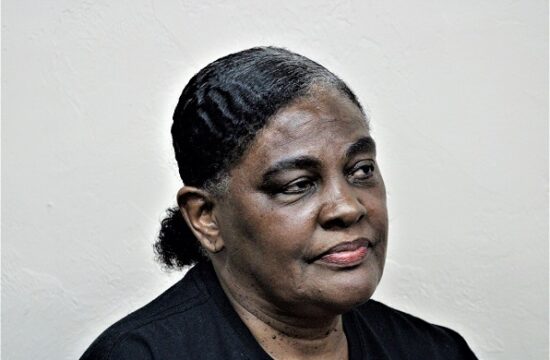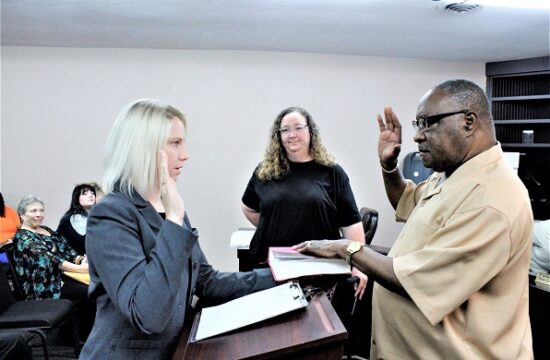By Terry Witt – Spotlight Senior Reporter
Bronson’s champion of constitutionally-protected free speech rights, Elijah Williams, asked Mayor Beatrice Roberts this week if the council would stop the practice of cutting people off when they are speaking to the board.
He also wanted to know why the council changed its agenda to eliminate the two public comment sections in meetings. Instead, the council permits one public participation opportunity if residents sign up in advance.
Williams asked if the council would give clear answers to members of the public asking questions and not ignore their questions and leave the questions and public comments out of the meeting minutes. He wondered if the council would agree to answer the questions at a later meeting if they couldn’t answer them at the meeting when they were asked.
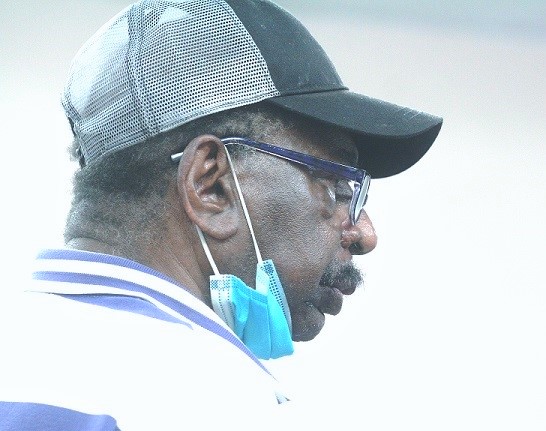
“You must understand that the people voted each and every one of you in, and they can vote you out,” Williams said. “So I feel the need to have some consideration and not get people riled up. Let them speak.”
His comments came in the wake of a recent meeting when a young man angrily left the meeting shouting a curse word after he didn’t get answers he thought were responsive to his questions.
After he left, City Attorney Steven Warm said the young man had committed a misdemeanor offense by disturbing a public meeting but added he wasn’t suggesting the council have the man arrested.
The council attempted to answer the young man’s questions which revolved around why the city built a sewer lift station in front of a vacant piece of property he owned and but now wouldn’t cut down trees to allow him to move a mobile home on the property. The council said it couldn’t legally improve private property by cutting the trees on his land but offered to let him pay for a private contractor to do the work at considerable expense to the man. He stormed out of the meeting after being asked questions by Councilman Aaron Edmondson who wanted to meet with him at the site to discuss alternatives.
Roberts was also sharply criticized in March when she met privately with Town Manager Susan Beaudet and made a decision to end public discussion of agenda items until the end of board meetings. Roberts ended the policy shortly thereafter and now takes questions and comments from the public during the meeting but she or Beaudet have removed the “public comment” section from the agenda. There were once two public comment opportunities on the agenda, one at the beginning of the meeting and one at the end, but those have been replaced by a public participation agenda item at the start of the meeting requiring advanced signup, a more restrictive approach to public comment.
A town election is approaching on Sept. 14. Qualifying for the election starts at 9 a.m. on July 30 and ends at 4 p.m. on Aug. 6. The qualifying fee to run for the council is $60.
Newly appointed Councilman Tyler Vorhees, who replaced Berlon Weeks, Mayor-Councilwoman Beatrice Roberts and Councilman Robert Partin are on the ballot, assuming they qualify to run. Residents must live permanently within the city limits of Bronson to hold office.
Roberts has been questioned a number of times about whether she lives in Raleigh with her husband or at the home she owns in Bronson. She has a homestead exemption on her Bronson home but rumors have persisted that she spends most of her time living at her family home in Raleigh.
When asked recently about the sensitive issue, she said she has two homes and cut off further discussion.
State law says elected officials must live in the city or county they claim as their home. County-elected officials must live in the county they claim as home. City and town officials must live in the town or city they serve or they can be removed from office by the governor.
Residency can be difficult to prove. The accuser must have evidence that the accused elected official doesn’t live where they claim. Following them home every night to prove where they live could prove expensive and costly if a private detective was hired. The Press could do the legwork if they wanted to devote that much time to it, but it’s not cost-effective. The public often must rely on the integrity of the elected official to live where they say they are living. Home is where the heart is, they say, but there are legal requirements under state law.
Williams began his discussion of giving residents the right to speak by noting he had attended a Williston City Council meeting recently and noticed the Williston board was more open to public comments. He noted Williston Council agendas offer the public comment sections, one at the beginning and end of meetings and there is no requirement to sign up in advance. Council President Debra Jones also allows people to ask questions and make comments from the audience, as does Roberts.
But Roberts has limited the public comment portion of the agenda to the very start of the meeting and is open only to people who sign up in advance to give a comment. They can also speak from the audience. Williams said Williston gives people five minutes to speak. He was under the impression Bronson speakers were limited to three minutes at Bronson meetings. Roberts corrected him. She said people get five minutes to speak and it’s been that way for a long time.
Williams asked for the council to listen to people. He suggested the council offer two public comment sections, one at the beginning and one at the end of meetings, and stop requiring the public to sign up in advance to take advantage of the public comment opportunity at the start of the meeting. Roberts said the Bronson agendas formerly allowed public comment at the beginning and end of meetings. She said often there were no people wanting to speak at the end of meetings, so the practice was stopped. But she wasn’t clear on whether she would be open to allowing public comment on the agenda at both ends of the meeting without a requirement for signing up in advance.
Williams also didn’t get an answer from Roberts on whether she would be open to answering questions at the next council meeting if the council didn’t have the answer at the meeting where the questions were asked. Williams said too often residents don’t get an answer at a meeting and no effort is made to respond to the question at the next meeting nor are the questions asked by the public recorded in the meeting minutes.
In response to Williams’s repeated assertions that people shouldn’t be interrupted or cut off and should be given a chance to speak, Roberts said there are limits.
“I have no problem. The only thing is you can’t let the public take over a meeting,” Roberts said.
——————————
Town of Bronson Regular Meeting June 21, 2021; Posted June 26, 2021



